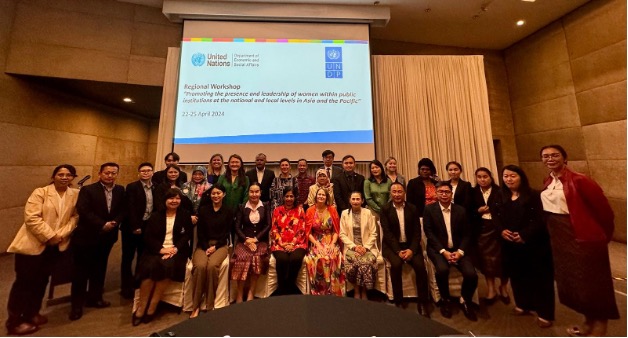Tshering Choden, Regional Gender Specialist, RBAP
Charting the Advancement of Women’s Leadership in the Public Sector in Asia Pacific
May 15, 2024

UNDP in partnership with UN DESA facilitated a regional workshop in Bangkok from 22nd to 25th of April 2024. It proved to be a dynamic platform, uniting public sector representatives from Bhutan, Brunei, Cambodia, Lao PDR, New Zealand, Solomon Islands, Sri Lanka, Thailand, Vanatu and The Philippines
Imagine a world where over half the population possesses untapped potential to lead, innovate, and shape the future. This is not just hypothetical—it reflects our current global landscape. Despite women constituting more than half of the global population, their representation in leadership roles lags strikingly behind.
The most recent UN SDGs 2023 report paints a picture of slow progress: as of January 1, 2023, women held just 26.5% of seats in parliaments worldwide. At the local government level, women occupied 35.5% of the seats. In the corporate world, the gap remains pronounced: women accounted for nearly 40% of the total workforce yet held a mere 28.2% of managerial positions as of 2021.
While in the public administration, as per data available by UNDP-Pitt 2021 Global Report on Gender Equality in Public Administration (GEPA), on average women are 46% of public administrators but occupy only 31% of top leadership roles and just 30% of senior managerial positions.
These disparities are not just a matter of fairness or equality—it's about harnessing a broader range of insights, experiences, and skills that women bring to the table, which are crucial for innovation and effective, responsive and accountable governance and achieving the SDGs.
Recognizing this, UNDP is spearheading efforts to bridge the gap as underpinned in its Gender Equality Strategy 2022-2025. Key to this initiative are the Gender Equality in Public Administration (GEPA) global initiative and the UNDP Gender Equality Seal, which certifies public institutions adhering to strict gender equality standards. Recently UNDP awarded more than 18 public institutions Awarding Public Institutions with UNDP Gender Seal.
One such initiative is the partnership with UN DESA project titled "Building capacities for promoting the presence and leadership of women within public institutions at national and local levels,"
The project, funded by the Government of Italy aims to enhance the presence and leadership of women in public institutions at national and local levels in Mauritius, Senegal, Bhutan, and Lao People’s Democratic Republic. Cambodia, Solomon Islands and Vanuatu are the project partnering countries in the Asia-Pacific region.
The project is supporting the development of national action plans to enhance the presence and leadership of women in public institutions. As part of the project intervention, UNDP in partnership with UN DESA organised a regional workshop in Bangkok from in April 2024. It proved to be a dynamic platform, uniting public sector representatives from Bhutan, Brunei, Cambodia, Lao PDR, New Zealand, Solomon Islands, Sri Lanka, Thailand, Vanatu and The Philippines.
During the workshop, participants explored strategies, policy shifts and institutional reforms geared towards promoting gender equality across all levels of public administration. The event served as a forum for collaboration and the sharing of experiences, with the goal of accelerating the adoption of gender-inclusive policies in public administration. Panel presentations, practical exercises and targeted group discussions, supported the peer review of action plans developed by Bhutan and Lao PDR to emphasize gender equality and advance women's career progression towards leadership roles within the public sector.
Key policy reforms and initiatives have been crucial in advancing gender equality in these counties in Asia Pacific.
The Philippines credits its success to the Magna Carta of Women (MCW), which tackles discrimination and promotes women's rights, ensuring women's increased participation in decision-making and policy-making roles.
Sri Lanka has implemented several policies, such as the Gender Equality and Women's Empowerment (GEWE) Policy and the Sexual and Gender-Based Violence (SGBV) action plan. These efforts have improved women's situations in the workplace and led to proposed laws promoting women to senior roles in the tri-forces and police.
Brunei has focused on female education since its first National Development Plan (1953-1958), which has lead to significantly enhancing women's literacy and participation in economic and political arenas.
New Zealand has fostered gender equality through its Public Service Act 2020 by promoting inclusive employment practices, addressing pay equity, and ensuring unbiased decision-making in remuneration.
While Cambodia benefits from its Gender Mainstreaming Working Group (GMAG), which develops and implements the Gender Mainstreaming Action Plan (GMAP) across government ministries, fostering gender equality and women's leadership.
In a similar vein, The Solomon Islands, has seen improvements through the establishment of gender focal points in the public service, supported by strong public administration leaders and political commitment. Host country, Thailand has gained insights and broadened its approach to gender equality by becoming the first in the Asia-Pacific to implement the Gender Seal for Public Service, recognizing that “variety of gender identities” beyond the traditional binary, is needed for promoting gender equality and leadership.
These strategies have provided invaluable lessons for Bhutan and Laos, which have crafted action plans with the support of UNDP and Un DESA to elevate women's leadership within their public sectors. In the coming months, the two countries will collaborate with a broad range of stakeholders to effectively implement these plans. By doing so, they are not just promoting gender equality; they are building robust foundations for women to achieve leadership roles and contribute equally in gender responsiveness of public institutions. These efforts are vital not only in creating equitable opportunities but in enriching governance with diverse perspectives, ultimately leading to more inclusive and resilient societies.

 Locations
Locations



